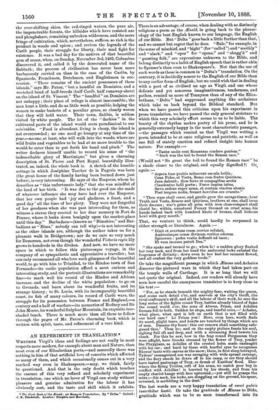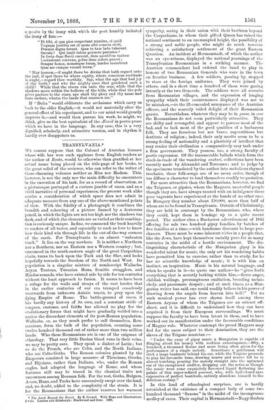AN EXPERIMENT IN TRANSLATION.* WHETHER Virgil's ideas and feelings are
not really in most respects more modern, for example about man and Nature, than most even of our Elizabethan poets,—and assuredly there was nothing in him of that artificial love of conceits which affected so many of them, and which occasionally comes out in a very marked way even in Shakespeare,—may, we think, fairly be questioned. And that is the only doubt which touches the essence of this very refined and scholarly experiment in translation, one which no lover of Virgil can study without pleasure and genuine admiration for the labour it has -obviously cost, and the taste and skill which it exhibits.
• The First Book of the .ineirl ; an lissay in Translation. By "Delta." Oxford : -J. R. Blackwell. London : Bimplcin and Mareball. There is an advantage, of course, when dealing with so distinctly religious a poem as the ,Eaeid, in going back to the phrase- ology of the best English known to our language, the English of our Bible. But" Delta "goes back a little further than that, and we cannot but regret that he does. "Bale," for example, in the sense of mischief, and "bight" (for "called") and" soothly" and "slack," and " opes " for "opens," and " shagg'd " and "guesting folk," are expressions unknown to the Bible, and belong distinctly to a habit of English speech that is rather akin to Spenser's than even to Shakespeare's. Not that the use of such words as these is common in "Delta's "translation. On th contrary, it is decidedly nearer to the English of our Bible than to any earlier form of English; but we could wish that in dealing with a poet of so civilised an age as Virgil, and one whose delicate and yet sonorous imaginativeness, tenderness, and pathos, remind us more of Tennyson than of any of the Eliza- bethans, " Delta " had suppressed anything like archaisms which take us back beyond the Biblical standard. But when we have passed this criticism upon his experiment in prose translation, we have passed the only general stricture to which this very scholarly effort seems to us to be liable. The beauty of the rhythm makes poetry of his prose, and he is generally extremely happy in the most characteristic passages, —the passages which remind us that Virgil was writing a poem intended to be at once religious and patriotic, as well as one full of stately emotion and refined insight into human nature. For example :— " 'rantte molls erat Romanam condere gentem." "Such was the toil to found the Roman race."
(Would not "So great the toil to found the Roman race" be
a shade closer to the original, and equally dignified?) Or, again :—
" Asper& tun' positis mitescent stecula bellis ;
Cana Fides, et Vesta, Remo cum fratre Quirinus, Jura dabunt ; dine ferro et compagibus arctis Claudentur belli portte ; Furor impius intus, Slava sedens super arms, et centum vinctus akenis Post tergum nodis, fremet horridus ore cruento."
"Then wars shall cease, and gentle grow the savage times; hoar Truth and Vesta, Remus and Quirinus, brothers at one, shall issue their decrees ; war's gates all grim with iron close-compact shall closM be ; within, unnatural Frenzy throned on cruel arms, his hands lashed back with hundred knots of bronze, shall hideous howl with gory mouth."
That, we venture to think, could hardly be surpassed in either strength or literalness. Again :—
" Dixit et avertens roses cervice ref ulsit, Ambrositeque comte divinum vertiee odorem Spiravere : pedes vestis defluxit ad imos ; Et vera incessu patuit Des."
"She spake and turned to go ; when lo ! a sudden glory flushed her rosy neck, and from her head the ambrosial locks exhaled the fragrance of divinity ; down even to her feet her raiment flowed, and all confest the very goddess trode."
Or take the magnificent passage in which 1Eneas and Achates discover the pictured wars in which they had taken part on the temple walls of Carthage. It is so long that we will not quote the original. Indeed, our readers will already have seen how careful the anonymous translator is to keep close to his text :—
" For, as he stands beneath the mighty fane, waiting the queen, and scans each detail o'er, and marvels at the city's thrift, the rival craftsmen's skill, and ;ill the labour of their work, he sees the long series of the fights round Troy, battles already blazed of fame the round world o'er, the sons of Atreus, Priam, and Achilles foeman fell to both. Sudden he stops, and tearful cries,—` Achates, what place, what spot is left on earth that is not filled with our hard case ? Lo Priam you! Here, even here, worth finds its meal, plight tears, and hearts are touched by things which are of men. Dismiss thy fears ! this our renown shall something safe- guard thee.' Thus he ; and on the empty picture feasts his soul, sighing full oft and deep, and with a streaming flood bewets his cheek. For this he saw, how in the fray round Pergamum they were aflight, here Greeks stressed by the flower of Troy, yonder the Phrygians, as Achilles of the crested helm made onslaught with his car; and hard by these with tearful eyes he recognises Rhesus' tents with canvas as the snow; them, in first sleep betrayed, Tydeus' ensanguined son was ravaging with wide spread carnage, and the fiery steeds he drave off to his camp, or ere they should have tasted pasturage of Troy, or drunk of Xanthus' flood. Else- where the flying Troilus, reft of his arms, no match poor boy in conflict with Achilles ! is hurried by his steeds, and from his empty chariot hangs with face upturned ;—yet still he grasps the reins ;—his neck, his locks, are draggling on the ground, his spear, reversed, is scribbling in the dust.'
The last words are a very happy translation of vend pulvis inecribitur hastii. Or take the gratitude of Aneas to Dido, gratitude which was to be so soon transformed into its
nvosite by the irony with which the poet humbly imitated the irony of fate :—
" Di tibi, si qua pios respectant numina, si quid Usquam justitia est et mens sibi console real, Prannia digna ferant. Qum te tam beta tulerunt Stecula ? Qui tanti talem gonuere parentes ? In frets, dum fluvii current, dum montibus umbras Lustrabunt convexa, polus dum sidera pascet ; Semper honos, nomenque taum, laudes manebunt QUEB me cunque vocant term."
"May heaven,—if aught there be divine that hath regard unto the just, if spot there be where equity, where conscious rectitude is aught,—regard thee worthily. Say, what the age that had joy of thy birth ? and who the mighty ones that gendered such a child ? While that the rivers run unto the seas, while that the shadows move within the hollows of the hills, while that the pole gives pasture to the stars, aye shall thy glory and thy name and fame endure, whatso the lands that summon me."
If "Delta" would obliterate the archaisms which carry us back to the older English,—it would not materially alter the general effect of his experiment, and to our mind would greatly improve it,—and would then pursue his work, he might, we think, give us the beat equivalent of the ,Eneid in poetic prose which we have in the language. In any case, this is a very dignified, scholarly, and attractive version, and in rhythm it hardly ever disappoints us.







































 Previous page
Previous page